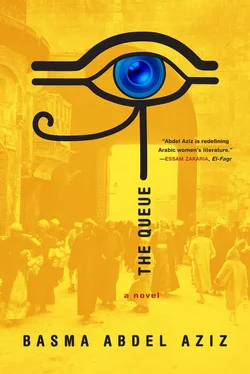“Hello, Yehya. I’ve got a letter for you from the office.”
Yehya seemed concerned by her sudden arrival, but he tried to appear welcoming, as if he’d been expecting her.
“ Ahlan, ahlan … how’re you doing, Um Mabrouk? I’m so glad you managed to make it.” She handed him the envelope, a smile still on her lips.
“I don’t know what’s inside — good news, I hope. Anything else I can do for you?”
“Thanks, you really shouldn’t have gone to all this trouble.”
Um Mabrouk rushed off, and Yehya’s heart trembled, sending convulsions down his left side and bringing him a new wave of pain. A faint shudder shook his hand as he held the envelope, which Nagy urged him to open. The only thing inside was an unlined white page with a few handwritten sentences.
Dear Yehya, I hope you’re doing well. I wanted to tell you that a doctor came to the office yesterday looking for you, he was wearing a military uniform and said he works at Zephyr Hospital, but he didn’t ask about anything else. Let’s meet soon. Amani .
After reading the letter, Yehya fell into deep and troubled thought. He didn’t want anything to do with the hospital or anyone in it. He hadn’t seen Amani for a whole week; they’d agreed on a time to meet and talk about what was happening, but he was stuck here in the queue. He passed most of the day there and sometimes even spent the night, as many others did. Nagy had offered to bring him a tent to sleep in, but he’d turned it down. He would rather be like everyone else, chatting until the early hours of the morning and then nodding off for an hour or two in his place. People around him stood there so resolutely, he hadn’t seen many sleeping or even sitting down in recent days. Everyone expected the queue to move at any minute, and they wanted to be ready. He found himself doing the same, even though he didn’t believe what they told him about the Gate — that it might open at dawn, or even deep in the middle of the night.
On her way back home, Um Mabrouk sank into a seat on the old metro, enjoying a moment of rest after a long, tiring day. In her heart, she knew she couldn’t work this hard anymore, not like she had when she was young and in full health. Um Mabrouk had first worked for Amani’s mother. Then Amani had introduced her to the owner of the company she worked for, and he’d hired her to clean, work in the kitchen, and lend a hand around the office three days a week. When Amani’s mother passed away, followed soon after by her father, Um Mabrouk started to work at Amani’s office full-time: five days a week, morning to afternoon, with only a few minutes for a lunch break. When the expenses for her apartment and children rose like floodwaters and she could barely stay afloat, she took on two more small houses for her days off. Um Mabrouk’s face was lined with sorrow. If fate hadn’t been so hard on her, she wouldn’t have been tossed from cleaning one house to another, working so many jobs.
Her train of thought was broken by a large, dirty-looking man who got into the metro car as the woman across from her rose from her seat. He rushed over in his tattered rags, rubbing up against Um Mabrouk’s knees as he slumped into the vacant seat. He stuck his head out the window and suddenly began singing gruffly and sucking at his long dusty hair. Um Mabrouk silently promised herself that despite how bad he smelled she wouldn’t get up until her stop; she could so rarely relax, and he was the least of her troubles. She watched him cautiously and edged her legs away, but that didn’t stop the man, who seemed half-crazed, from curiously reaching out to grab at her breasts. Um Mabrouk jumped up, screaming and cursing at him, and hit him with her bag, which opened up, and the broken old rotary phone she’d taken from the office to repair fell onto the floor. The man panicked at the clatter, leapt toward the metro door in fright, and jumped out before the train stopped at the next station.
Shouts of fear and confusion rose up from the women around her. She heard mutters of shame from a few passengers, and a tall man whispered that a woman’s place was in the house, his gaze fixed on the ground. Someone else quoted a passage from the Greater Book, and although she couldn’t make out what he said, she sensed from his tone that it was directed at her. A young boy came up to her and asked if she was hurt; he was no more than twelve and wearing a school uniform that was clearly old but well kept. “Bless you, darling,” she said, as she patted him on his shaved head. She continued the string of insults she’d begun, and then bent over to pick up the telephone and reattach the handset, and sat down again. The man had really scared her, but she blamed herself. After all, she’d decided not to give up her seat across from him, and she had sat there while the rest of the passengers had given him space as soon as they’d seen him.
She was forever cursed with bad luck, and there was no end to her problems, no matter how much she tried to set things right. Her eight-year-old son was sick with a bad kidney and was always in and out of the hospital for more treatments. She’d taken him in several times in just the past month, and watched as his slender body was pumped with what seemed like gallons of medicine. Her two older daughters couldn’t help with the bills because they were both weak with rheumatic heart disease. By the time the doctor had read her the results of the X-rays and medical tests that had diagnosed their condition, they had already fallen far behind in school.
All she had was two rooms in a damp ramshackle apartment, buried deep in an alleyway in the old District 3 where the sewers bubbled over, and a husband who never left the coffee shop, who’d quit his job and wandered around idly in search of hash and pills. She saw him only when he ran out of the money he took from her small salary, sometimes by pleading with her and sometimes by force. Every so often at night he would leave the coffee shop and come begging, demanding more money, and when she scolded him he berated her and sometimes even beat her. On top of all that, two months ago she’d fallen and broken her hand while cleaning the ceiling in the office, and then she broke her left foot when she’d jumped off a microbus. The pain hadn’t let up since then. As if everything else wasn’t enough.
Neighbors who noticed her never-ending woes advised her to find out why she suffered such misfortune, and so she did. She visited the High Sheikh, before that too was forbidden — forbidden, at least, without a permit from the Gate — and he told her bad luck followed her because she’d neglected her prayers. The remedy to poverty was to bow down and pray and to stop her grousing and complaining. Her head filled with so many words, and a way out of this suffering seemed to open up before her. Tears of humble remorse flowed down her cheeks, and she swore she would uphold her religious duties and never miss a prayer. She even bought a white scarf to keep at Amani’s mother’s house so she would be sure to have one for praying there, but she stuck to her new commitment for fewer than two weeks and her bad luck never left her. Some days she forgot, and on others she put off her ablution until she finished work. At the end of the day she would discover she had all her prayers left to do, and, exhausted, she’d vow to start anew the next day at dawn. But then she’d wake up late and run straight out the door, intending to make it up throughout the day, and on it would go. She had so much trouble sticking to what she set out to do, sometimes she wondered if she might even be possessed by an evil spirit.
She walked the rest of the way home from the metro station, and before she crossed the crumbling wooden threshold she took off her shoes and tucked them under her right arm. She climbed the stairs with feet as rough as the slanted steps, which were pocked with knots and holes. She pushed open the flimsy front door, dropped her shoes, and called for her son, Mabrouk. She took out the phone and gave it to him, smiling so wide for him that her eyes scrunched up into two tiny dots. But Mabrouk cried when he lifted the speaker to his ear and didn’t hear the dial tone he remembered from when they’d once had a landline, back when he was a baby. Surrounded by a tangle of wires, she promised him that the dial tone would be there in just a few days. She remembered the notice she’d received from the Gate a year earlier, stating that she wasn’t entitled to a phone line due to misconduct. But that must have been a mistake, she told Mabrouk now; she was sure the Gate would sort it out soon.
Читать дальше











